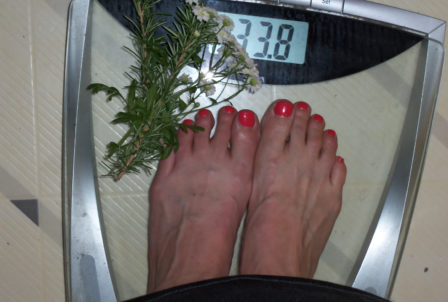Herbs for Metabolic Syndrome
Metabolic syndrome is the name being given to a variety of familiar symptom clusters. One of the primary symptoms is becoming overweight and especially with “belly fat.” Other symptoms include insulin resistance (over production of insulin and poorly controlled blood sugar), inflammation (joint and muscle pain), digestive problems (cramps, gas, burping, constipation/diarrhea), hormonal imbalances (water retention, emotional upheaval, fatigue) and sluggish thought processes (forgetfulness, short temper, poor concentration/comprehension).
Overweight is the most common place for most of us to begin our awareness of this syndrome. And while the real goal of any treatment program is actually to improve body function, losing weight is the desirable “side effect” that most of us concentrate upon.
Anyone who has attempted to lose weight can tell you about the “plateaus” that they experience where they seem to be doing all the right eating and exercise but cannot seem to get more pounds off. From the metabolic syndrome perspective, this is information from your body that there is something beyond: “calories in/calories burned” that needs to be addressed. Until the underlying issue is addressed, you will be stuck on the plateau. This is often the barrier to sustainable weight loss. You can use these weight loss plateaus as signals that it is time to address another underlying cause of metabolic syndrome and resolve a health issue.
There is a seven step process, according Dr. Mark Hyman of the Institute of Function Medicine and author of the recent book “The Blood Sugar Solutions,” to reverse metabolic syndrome. We will review his steps and discuss some herbal supplements that can support each one of them. According to Dr. Hyman’s research findings, the necessary steps are: boost nutrition, regulate hormones, reduce inflammation, improve digestion, maximize detoxification, enhance energy metabolism, and soothe your mind.
For nutrition, you have all heard that avoiding processed foods and focusing on vegetables and protein, while minimizing the carbohydrate load is the recommended diet. One herb that is a nutritional star to add to this plan is Stinging Nettle. It can be taken as a tea, tincture or in a capsule, and also as a fresh addition to stir-fried greens. It is a concentrated source of minerals that are often lacking in our diets, including magnesium, potassium, silica, calcium, iron and trace elements.
The main hormone that we seek to balance is insulin, but this will require balancing all of your other hormones, including thyroid, sex, growth, and stress. The thyroid responds well to the bio-available iodine found in Bladderwrack seaweed. This is usually found in capsules for ease, but you can certainly eat it as part of your diet.(note: drinking fluoridated water can strip your thyroid of iodine, since fluoride competes for receptor sites.)
Repairing the damage from adrenaline/ cortisol is more complex, with herbs such as basil, American ginseng and eleuthero being useful. The sex and growth hormones respond well to the inclusion of maca, which comes as a powder that is easily added to smoothies, muffins and other food items, or can be taken as a capsule. Insulin itself can be kept more stable by the use of cinnamon, especially if it is taken with the carbohydrate and starchy foods.
Reducing inflammation is a natural outcome from changing your diet to the low-glycemic index type diet. Some herbal supplements that can come in handy to address this issue are turmeric, ginger and cayenne. If this sounds a lot like curry powder to you, then you are on the right track to knowing how to use it. Some other well-known anti-inflammatory herbs are chamomile and willow bark, easily taken in the form of tea. Mild food allergies are often the cause of inflammation. Allergies often respond immune support from reishi mushroom, astragalus root and ashwaganda.
Improving your digestion is a matter of stimulating proper secretion of digestive enzymes and prompting the efficient action of elimination. Digestive bitters taken before each meal is the simplest and most effective way to make this happen. There are a number of herbal blends, the most well-known being “Swedish Bitters” that are readily available. However, anything bitter will do the job. Adding dandelion leaf and arugula to the salad is one way to include bitters. I like to use a tincture of mugwort, yarrow, orange peel and angelica root that I make myself. Consistency is the key. A bonus on taking bitters is that it will also lower your LDL cholesterol by 10 percent or more, over the course of a year.
Detoxification is just a fact of life for all of us. We are constantly exposed to a barrage of chemicals from our air, food packaging, cosmetics, our jobs, even touching sales receipts with our bare hands. So, detoxification needs to become a regular routine and ritual. Yellow dock and cascara sagrada, along with milkthistle extract with help the liver to do the periodic job. Do this a couple of times a year for a week, along with a simplified diet and rest.
Upping the metabolism is not done with stimulants such as Red Bull or coffee. Anti-oxidants foods are one of the more effective approaches. These come in foods with intense flavor, color and aroma. Add rosemary, drink green tea, and take gotu kola to go along with a regular exercise program.
Herbal supplements are champs when it comes to soothing your mind. Some taste good as teas all by themselves such as lemon balm, linden, oatstraw and licorice. Others, such as skullcap and passion flower, need to be mixed with something tastier. All will go well with some meditation tapes.
Take your herbs along with your steps to improving your metabolism. Read “The Blood Sugar Solution: by Dr. Mark Hyman for more details, self-diagnostic quizzes and ways to personalize your program. Or, come to Pharmaca Pharmacy in La Jolla on Sept. 8 at 1 p.m. for an hour-long, free workshop on the subject by Charlotte.
Category: Life Style









